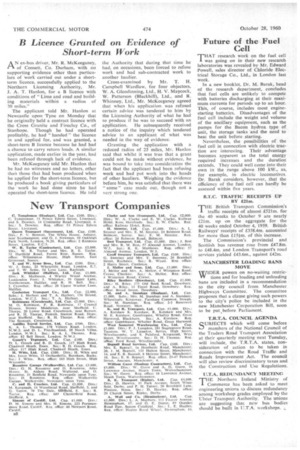Future of the _Fuel Cell
Page 42

If you've noticed an error in this article please click here to report it so we can fix it.
'THAT research work on the fuel cell I was going on in their new research laboratories was revealed by Mr. Edward Powell, sales director of Chloride Electrical Storage Co., Ltd., in London last week.
In a new booklet, Dr. M. Barak, head of the research department, concludes that fuel cells are unlikely to compete with batteries discharging at their maximum currents for periods up to an hour. This, of course, includes most enginestarting batteries. DisadvantageS of the fuel cell include the weight and volume of the ancillary equipment, such as the pumps for the Bacon hydrox type of unit, the storage tanks 'and the need to heat the unit before starting.
Nevertheless, the possibilities of the fuel cell in connection with electric traction are interesting. Their advantage becomes apparent as the total energy required increases and the duration extends. They could well come into their own in the range above 100 kW., as, for example, in electric locomotives. Dr. Barak considers, however, that the efficiency of the fuel cell can hardly be assessed within five years.
B.T.C. TRAFFIC RECEIPTS UP BY £21m.
THE British Transport Commission's traffic receipts of almost £521m. for the 40 weeks to October 9 are nearly 121m. up on the aggregate for the 40 weeks ended October 4, 1959. British Railways' receipts of £358.4m. accounted for more than £151m, of this increase.
The Commission's provincial and Scottish bus revenue rose from £47.8m. to £48.4m. and London Transport's road services yielded £43.6m., against £42m.
MANCHESTER LOADING BANS MOVE
WIDER powers on no-waiting residedons and for loading and unloading bans are included in a recommendation to the city council from Manchester Highways Committee. The committee proposes that a clause giving such powers to the city's police be included in the new Manchester Corporation Bill, soon to be put .before Parliament.
T.R.T.A. COUNCIL AGENDA
SUBJECTS which will come before members of the National Council of the Traders Road Transport Association at their quarterly meeting next Tuesday, will include, the T.R.T.A. states, consideration of action to be taken in connection with the Road Traffic and Roads Improvement Act. The council will also review discriminatory taxes and the Construction and Use Regulations.
U.T.A. REDUNDANCY MEETING
THE Northern Ireland Ministry of Commerce has been asked to meet engineering unions to discuss redundancy among workshop grades employed by the Ulster Transport Authority, The unions are suggesting that new bus bodies should be built in U.T.A. workshops. „




















































































































